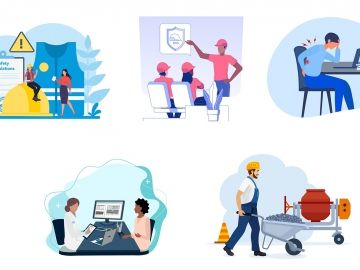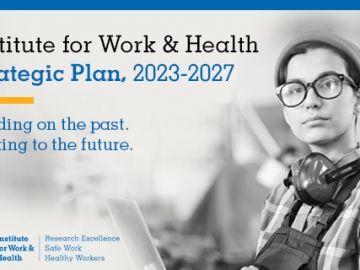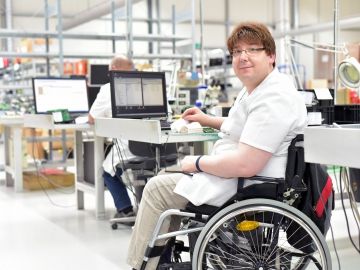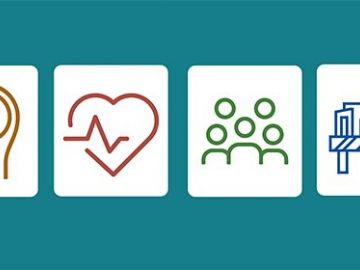What's new

5 Things We Think You Should Know
Our annual edition of 5 Things We Think You Should Know is out now! This publication outlines five IWH research findings from the past year that we think can make a difference to workplace injury and disability prevention programs. It's available online and as a sharable PDF.

Lancet series calls for greater attention to work as social determinant of health
Work is a social determinant of health and decision-makers across government departments should look more to work interventions as potential levers for addressing health inequities. That’s a key message from a series of papers published in October 2023 by The Lancet, with IWH scientists among the co-authors.

Media release - Worker injuries due to falls from heights declined after training made standard and mandatory: study
November 3, 2023 (Toronto, Ontario)—In the three-year period after Ontario made working-at-heights training in the construction sector standardized and mandatory, the rate of fall-from-height injuries leading to time off work fell by 19 per cent, a study by the Institute for Work & Health (IWH) has found.

What is the impact of depression on years of employment among working-age adults?
If someone experiences depression, what is the impact on the length of their future working life? It depends on how, and when, someone experiences depression. An IWH study found five trajectories of depression in working adults, each with varied impacts on their future years of work.

Media Release - Addressing work conditions to improve public health: a series in The Lancet
October 12, 2023 (Toronto, Ontario)—Working conditions can have an impact on health and unequal health outcomes across the population. As a result, decision-makers from across different government departments should take greater note of work as a social determinant of health. That is a key message from a series of three papers published today in one of the world’s leading medical journals, The Lancet.

IWH study finds workers are using cannabis to treat work-related conditions, mostly without medical guidance
One in seven workers with a work-related physical injury or illness said they used cannabis to treat the condition. That’s according to an IWH study based on interviews conducted with workers 18 to 36 months after their work-related illness or injury. Importantly, most of these workers had not received medical guidance on the therapeutic use of cannabis.

IWH study examines RTW experiences of Ontario police service members
A recent IWH study examined the experiences of sworn and civilian Ontario police service members returning to their jobs after experiencing an injury or illness. The research team found that their return-to-work (RTW) challenges revolved around five main themes.

IWH researchers create roadmap for AI research that prioritizes worker health
What are the most urgent research questions on the impact of artificial intelligence (AI) on worker health and safety? Using expert insights, an IWH team has developed a four-part agenda to guide AI research and spark conversations between workplaces, workers and regulators. Its goal is to ensure worker health and safety are at the forefront of AI policy and adoption in the workplace.

What research can do: Following reports by IWH and others, B.C. strengthens protections against claim suppression
After an IWH study filled a research gap on workers’ compensation claim suppression in B.C. and helped make the case for change, the province amended legislation to strengthen protections against the practice. Read this shortened summary of our latest impact case study to learn more.

What do physicians need to know to support patients’ RTW?
While primary care physicians play an important role in helping ill and injured workers return to work (RTW), they have a variety of learning needs about how to best navigate the RTW process. That’s according to an IWH study that found that physicians could benefit from additional training in four main areas: administrative tasks, personal beliefs about RTW, specific occupational health issues and available RTW services and tools.

Scientist Dr. Arif Jetha appointed associate scientific director
IWH Scientist Dr. Arif Jetha takes on a new role as associate scientific director, effective September 1. In this role, he will work with the scientific director to ensure the standards of scientific evidence are maintained at IWH and that the scientific objectives set out in the IWH 2023-2027 Strategic Plan are fulfilled. Jetha will also play an active role in providing mentorship to IWH scientific staff, particularly those early in their careers, as well as post-doctoral, doctoral and masters students.

Telementoring program helps care providers with challenging RTW cases
The first two rounds of the world’s first ECHO program on occupational and environmental medicine (OEM) have wrapped up, and preparation is underway for a third round this fall. We spoke to some of the health-care practitioners who attended the first two rounds to learn how ECHO OEM has helped with their most challenging return-to-work cases.

IWH launches new award for early-career researchers
IWH is now accepting applications for the newly launched Cameron Mustard Early Career Accelerator Award. Named after the former president and senior scientist at IWH, this award was set up to honour Mustard’s commitment to mentoring future generations of work and health researchers and to strengthening the work and health research ecosystem.

We’re hiring a Director, Strategic Relations (maternity leave)
IWH is looking for a Director, Strategic Relations to cover a 13-month maternity leave beginning mid-September. This individual will work with IWH’s Executive, KTE and Communications teams diversify and expand IWH’s research and stakeholder networks and impact. They will also identify opportunities for IWH expertise to contribute to the development of policies, programs and resources at the provincial and federal levels—particularly within Ontario’s prevention system.
News release: Cannabis use outside of work hours not associated with increased risk of work injury, study finds
July 31, 2023 (Toronto, Ont.)—Are workers who use cannabis at greater risk of having an injury at work? Yes, but only those workers who use cannabis during or before a work shift. Workers who only use cannabis outside of work hours are at no greater risk of getting injured at work than workers who do not use cannabis at all.

What racial, ethnic inequities exist in return to work?
In the first systematic review on the subject, the Institute for Work & Health (IWH) examined the research literature on racial and ethnic inequities in return to work. It found strong evidence that non-white workers are less likely than white workers to return to work following an injury or illness—and moderate evidence that Black workers face pronounced barriers.

Role of IWH research in changes to B.C. legislation on claim suppression
After an IWH study filled a research gap on claim suppression in B.C. and helped make the case for change, the province amended legislation to strengthen protections against the practice.

IWH associate scientists promoted to scientists
Two IWH associate scientists were promoted to scientists effective July 1, 2023. Dr. Avi Biswas and Dr. Nancy Carnide received their promotion after two members of the Institute’s Scientific Advisory Committee reviewed dossiers outlining their research activities as associate scientists, as well as their future plans as IWH scientists. In each case the recommendation to promote was unanimously positive.

IWH study finds associations between workers' physical activity patterns and cardiometabolic health
According to an IWH study, Canadian workers typically fall into six patterns of daily movement that are associated with varying levels of cardiometabolic disease risk. In general, workers with higher daily activity levels had lower levels of cardiometabolic disease risk factors, but those with moderate activity levels also showed lower risk factors.

What research can do: Tell us your stories about using IWH research
Have you used IWH research, shared it with colleagues, endorsed it to your network, or referenced it in your communication materials? We want to hear from you! We love hearing about and profiling stories of how IWH research has helped our stakeholders and partners. Your stories will help us assess the impact of our work and improve its usefulness to you.

New social innovation lab launched to build employer disability confidence
A new social innovation lab, called Inclusive Design for Employment Access (IDEA), has hit the ground running. It’s now looking for partners across Canada and across all sectors to identify, develop, pilot and scale up innovative solutions to overcome labour-market barriers for persons with disabilities. IDEA aims to skill up workplaces so that they are confident in their ability to provide meaningful employment for persons with disabilities.

IWH’s new strategic plan aims to strengthen work and health research in an ever-changing society
Building on the past, looking to the future. This is the basis of the Institute for Work & Health (IWH)’s new five-year strategic plan, in which IWH sets out its goals to use the research expertise and partnerships it has built over the past 30 years to address complex work and health challenges.

Imagining the future of work for young adults with disability
What will work look like in 2030 for young adults living with disability? Using established strategic foresight methods, an IWH team generated three future scenarios. The scenarios are designed to provoke discussions in Canada about the policies and programs needed now to ensure inclusive work in the future for persons with disabilities.

The Institute for Work & Health releases 5-year strategic plan
The Institute for Work & Health (IWH) has released its 2023-2027 Strategic Plan, which outlines four strategic directions that will guide the Institute in producing and sharing work and health evidence. This plan is the result of a year-long process that engaged stakeholders, members of the IWH Board of Directors and staff to take stock of IWH’s strengths and identify opportunities and priorities for the next five-year period.

New study examines the job quality of persons with disabilities
Persons with disabilities are not only less likely than those without disabilities to find work. When they do, they are also twice as likely to find themselves in insecure, unrewarding jobs. This was a key finding from a recent IWH study that used a national survey to investigate what kinds of jobs persons with disabilities obtain compared to those without disabilities.

Marking Day of Mourning
Every year, on April 28, we mark National Day of Mourning to remember those who have died or suffered health consequences due to work hazards. On this day, especially, we renew our efforts to make work safe and healthy for all.

Sign up now: Inclusive Design for Employment Access (IDEA) launch event
On Thursday, May 18, the Inclusive Design for Employment Access (IDEA) social innovation laboratory is hosting a launch event. This partnered, knowledge-to-practice initiative is focused on building employers’ capacity to hire, promote and retain persons with disabilities, and to create accessible and inclusive workplaces.

2023-2024 Syme Research Training Awards now accepting applications
Calling early-career researchers at the master’s or doctoral level intending to study work and health: apply now for a 2023-2024 S. Leonard Syme Research Training Award. Three training awards of $5,000 each are available. The deadline for applications is Friday, May 5, 2023.

Now available: a tool to help workers with chronic conditions find job-tailored supports
The IWH-led Accommodating and Communicating about Episodic Disabilities partnership has officially launched the Job Demands and Accommodation Planning Tool (JDAPT) for workers. The evidence-based tool is designed to help workers with chronic conditions identify job supports that they can implement — on their own or with their supervisor’s approval — that allow them to keep working safely and productively without having to disclose their health condition.